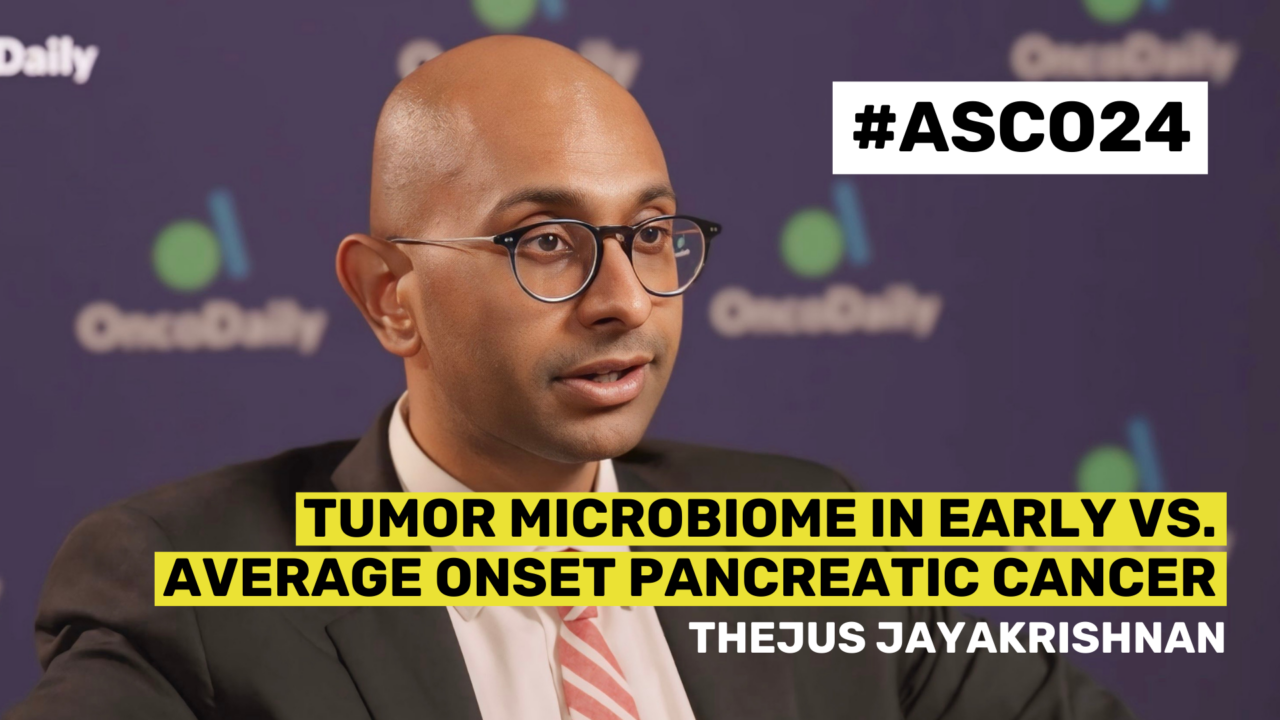
ASCO24 Updates: Dr. Thejus Jayakrishnan on Tumor Microbiome in Early vs. Average Onset Pancreatic Cancer
The American Society of Clinical Oncology (ASCO) Annual Meeting is one of the largest and most prestigious conferences in the field of oncology. This year, the meeting took place from May 31 to June 4 in Chicago, Illinois. The event gathers oncologists, researchers, and healthcare professionals from around the world to discuss the latest advancements in cancer research, treatment, and patient care. Keynote sessions, research presentations, and panel discussions are typically part of the agenda, providing attendees with valuable insights into emerging trends and innovations in oncology.
This year, OncoDaily was at ASCO 2024 for the first time covering the meeting on-site. We had the pleasure of interviewing researchers who summarized the highlights of their work.
In this video, Dr. Thejus Jayakrishnan from Cleveland Clinic, shared insights on ‘Tumor microbiome differences in early-onset versus average-onset pancreatic adenocarcinoma.‘
My name is Thejus Jayakrishnan. I am a hematology oncology fellow at Cleveland Clinic. I’m excited for the opportunity to talk about the research that I will be presenting at ASCO 2024.
And we looked at the tumor microbiome differences in early onset versus average onset pancreatic ductal adenocarcinoma. I will be referring to it as PDAC. And what we found was there significant differences in the diversity of the bacteria and fungi.
In this study, what we are noticing more recently is that there has been increasing incidence of early onset PDAC. So about 5% to 10% of people with pancreatic ductal adenocarcinoma develop it at a really younger age, defined as less than 50 years of age. And there has been increasing incidence of people developing early onset PDAC.
And we aim to look at the microbiome differences in those who develop pancreatic cancer early versus later in life. And we used a technique called shotgun metagenomic sequencing, where we do untargeted sequencing of microbiome from the tissue samples. And we can look at both bacteria and fungi, so the bacterial microbiome and fungal microbiome in the tissue specimens.
And the reason why we did that was because there is increasing evidence about the role of microbiome in cancer formation. And there are also investigations looking at the predictive and prognostic role of microbiome signatures in cancer. And we wanted to specifically look at early onset PDAC, where there is a knowledge gap.
And using our analysis, what we identified was that there were significant differences in the alpha-diversity or the richness or the abundances of bacterial species in the tumor specimens between early onset and average onset PDAC. And it was higher in early onset PDAC. And there is beta-diversity, which denotes the differences of the different microbial taxa.
So there was beta-diversity, which was significant between the different tissue types, meaning early onset and average onset PDAC. And this was more prominent for bacteria as opposed to like fungi. But we did see significant differences in the organisms.
We also looked at differential abundance analysis, looking at the concentrations or abundances of microorganisms in different tissue types. And we saw that there were certain organisms that were differentially more abundant in one tissue versus the other. So what all this points out is that there is a unique microbiome signature associated with early onset PDAC.
And as a result, and to like investigate further, we also looked at the correlation with survival. And we found that the bacterial diversity in the tumor tissue correlated with survival. In other words, higher bacterial diversity indicated or correlated with better outcomes and better survival.
And this suggests a potential prognostic role of microbiome in early onset PDAC. There are certain limitations to the study. We used FFPA specimens.
Limitations for shotgun metagenomic sequences are also being established. But we used a rigorous and well-validated protocol for conducting our study. We had to use shotgun metagenomic sequencing.
And we limited our sample to resected pancreatic cancer specimens because we needed a larger biomass, especially given the low biomass or low bacterial concentration in FFPA specimens. Those are the overall findings of our study. And we are interested and we plan to validate our findings in larger samples.
And the next steps would be to validate and also investigate opportunities for modulating the microbiome to improve outcomes for people with pancreatic diabetic ulcerative colitis. Thank you.
More videos and content from ASCO 2024 on OncoDaily.
-
Challenging the Status Quo in Colorectal Cancer 2024
December 6-8, 2024
-
ESMO 2024 Congress
September 13-17, 2024
-
ASCO Annual Meeting
May 30 - June 4, 2024
-
Yvonne Award 2024
May 31, 2024
-
OncoThon 2024, Online
Feb. 15, 2024
-
Global Summit on War & Cancer 2023, Online
Dec. 14-16, 2023
